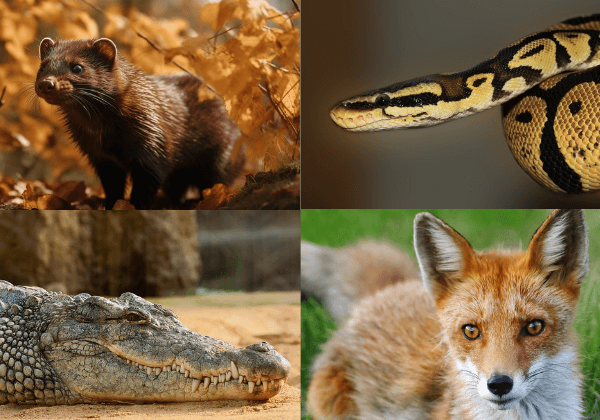India Bans Export of Reptile Skins & Various Items of Animal Fur Following Efforts by PETA India, Maneka Gandhi
In a major victory for wildlife, the Government of India has accepted key recommendations made by PETA India aimed at significantly strengthening safeguards for various wild animals, including those protected under the Wildlife Protection Act, 1972 or the Convention on International Trade in Endangered Species of Wild Fauna and Flora (CITES). Former Union cabinet minister and veteran parliamentarian Maneka Gandhi also advocated the recommendations. PETA India aims to ensure the reintroduction of the 3 Jan 2017 ban on imports of reptile skin, furskin of mink and fox, which was overturned on 7th January 2021.
PETA India’s recommendations targeted ITC-HS codes under Chapters 41 and 43, specifically:
- Raw and Tanned Hides of Reptiles (41032000, 41064000)
- Leather from Reptile Skins (41133000)
- Raw Furskins of Mink and Fox (43011000, 43016000)
- Apparel and Accessories Made from Wild Animal Fur (43031010, 43031020, 43039010, 43039020)
Through Trade Notice No. 11/2024-25, dated 2 August 2024, the Directorate General of Foreign Trade (DGFT) proposed amendments to harmonise the export policy across Chapters 40 to 98. PETA India responded by highlighting the policy’s omission of critical protections for vulnerable species. On 11 August 2024, PETA India submitted a detailed letter to DGFT, urging immediate changes to safeguard wildlife from exploitation.
PETA India’s export-focused recommendations have been accepted and incorporated into the export policy. This means that the export of reptile skins—treated or untreated—and raw fur skins of mink and fox (whole, with or without head, tail, or paws) has been banned. Additionally, any apparel or clothing accessories made from animals protected under the Wildlife (Protection) Act, 1972 or the Convention on International Trade in Endangered Species (CITES) have also been prohibited.
Furthermore, imports under these ITC-HS codes are now subject to the following conditions:
“Imports are subject to the Wildlife (Protection) Act, 1972 (as amended from time to time) and CITES.” However, PETA India urges a complete ban on wild/exotic animal skins and fur imports.
Globally, Austria, Belgium, Croatia, Czech Republic, Slovenia, Bosnia and Herzegovina, Luxembourg, Serbia, Italy, France, North Macedonia, the Netherlands, Ireland, the UK, Norway, Estonia, Latvia, Lithuania, Romania and Switzerland have either banned fur farming, are moving toward a ban coming into place or do not have fur factory farm.
Thanks to efforts by PETA entities, numerous major brands have policies against the sale of exotic skins, such as those from reptiles and snakes. These include Chanel, Nike, Calvin Klein, Asos, H&M, Hugo Boss, and many others.
View this post on Instagram
PETA India’s recommendations highlighted that allowing the trade of wildlife skins, fur, and related products encourages illegal activities, harms ecosystems, and poses severe public health risks, such as zoonotic diseases. There is extreme cruelty involved in procuring these products, which often includes skinning animals alive and keeping them in appalling conditions.
The revised Chapters 41 and 43 of the ITC-HS codes are now available for public reference.
Always Shop Animal-Friendly and Vegan!









